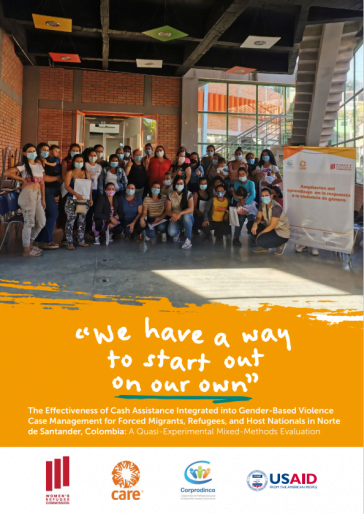The Effectiveness of Cash Assistance Integrated into Gender-Based Violence Case Management for Forced Migrants, Refugees, and Host Nationals in Norte de Santander, Colombia: A Quasi-Experimental Mixed-Methods Evaluation
Gender-based violence (GBV) is a pressing concern for forced migrant and refugee women, girls, and individuals with diverse sexual orientation, gender identity and expression or sex characteristics (SOGIESC). They face exposure to and incidents of GBV before, during, and after a humanitarian crisis. Humanitarian actors use a variety of approaches to prevent, mitigate, and respond to GBV, yet evidence gaps remain in informing comprehensive program models that improve the lives and protect the rights of GBV survivors as well as individuals at risk of GBV.
As a complement to core aspects of GBV case management, preliminary evidence finds that cash and voucher assistance (CVA) may strengthen survivors’ capacities to recover from GBV and enable access to services. For example, CVA can help a GBV survivor to pay the costs associated with fleeing an abusive relationship, such as temporary accommodation and transportation, and to access legal assistance. There may also be indirect pathways in which CVA could be used by survivors and individuals at risk to reduce their exposure to GBV, such as decreasing their financial dependence on abusive partners or family members, and shifting power dynamics in intimate relationships.
As an alternative to traditional in-kind assistance, CVA has become an increasingly common tool across humanitarian response sectors to meet the needs of those displaced by crisis and conflict. In 2019, approximately
18 percent of humanitarian assistance globally was delivered via CVA,
and this proportion continues to grow. Despite a push by several humanitarian actors to increase the use of CVA within the protection sector to support protection outcomes, including to support the prevention of and response to GBV, CVA is the least used for protection outcomes out of all sectors.



